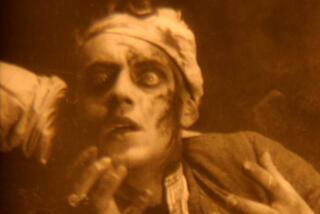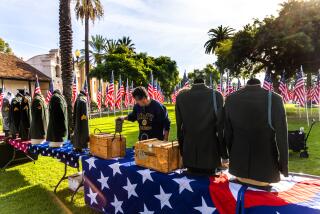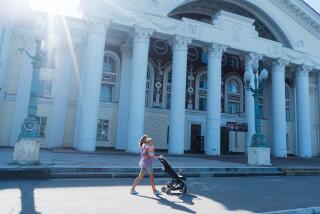A Soviet Memorial Etched by Ambiguity
- Share via
Some old soldiers of the Red Army, in their odd, boxy uniforms covered with rows of cheaply made medals, are getting ready in West Hollywood for the dedication of a city- and county-sponsored memorial. It will be, appropriately for a city with a large community of elderly Russian emigres, the only monument in America to veterans of the Soviet military. A tilted slab of red granite, engraved with the figures of cranes and lines from a Russian poem about dead fighters rising on wings from the battlefield, will honor comrades who fell in the Great Patriotic War against Nazism.
I was born a soldier of the next war, the one already underway in the fall of 1948 while Soviet tanks blockaded Berlin and President Truman campaigned for election on his willingness to do the unthinkable with the nation’s atomic arsenal. I was schooled in the “Red menace” by the Sisters of St. Joseph in the 1950s and drilled for the coming fight in monthly “duck, cover and hold” exercises. The Cold War plan of battle assumed that my classmates and I would be casualty statistics, but we were assured this would be our contribution to the war effort.
It was the same “either/or” fight in high school, with maps in every classroom showing the front line dividing East from West. For two of those high school years, I studied Russian under a Czech refugee priest who had learned the language while on the run from the communists. In the mid-1960s, Americans feared they were slipping behind in various races -- to the moon, to better bombs -- and, Father Jacob said, the United States would need Russian speakers to compete with our enemy.
I remember only some words of the practice dialogues and some lines from Russian songs about bells and Katushya rocket launchers. I bought a couple of Red Army Chorus LPs, and I went to a film festival to see Sergei Eisenstein’s “Alexander Nevsky,” produced in the Soviet Union in 1938.
There is a scene at the end of the movie, set in the 13th century, that follows the battle between the defenders of the Russian city of Pskov and its German besiegers. The liberated survivors go out into the snowy fields to collect the city’s dead. One of the women sings a haunting lament that prefigures, to me, the anguish and resolve in the epic defense of Stalingrad against Hitler’s murderous onslaught.
World War II, some historians say, was won at that city’s gates in 1943 or, at least, the winning of it was made possible. The army of one great evil crasheddisastrously into the defending army of another evil, one that had been complicit in 1940 in making the war possible. The victory of the Red Army was heroic on anyone’s terms, and yet it was compromised by the fate of Poland and the Baltic states and the history of the Soviet gulag and Stalin’s pogroms.
But heroics are always crossed with ambiguities. Perhaps every monument should carry an asterisk: Remember us, but do not forget what things were done to get us here.
Los Angeles is getting crowded with memorials that jostle for our attention, which is a good thing for a place that encourages easy forgetting and celebrates memory loss as “closure.” Not as good is the fierce sentimentality that can hang on civic marble or roadside flowers and votive candles. Public sentimentality is as much an enemy of the purposes of memory and history as is a preference for amnesia.
Memory is supposed to be served at the Red Army memorial. A digital video display will call up clips of the old soldiers talking about their wounds and losses and, I hope, the uncertainties of their battles, in which they were ultimately both the victors and the defeated. I wish there were another piece of marble nearby for us who are veterans of the Cold War, in front of which our losses, though different, might be considered.
But that will have to wait for the end of the latest war, into which we’ve all been drafted again, elderly Soviet veterans and middle-aged Cold Warriors -- comrades at last.


